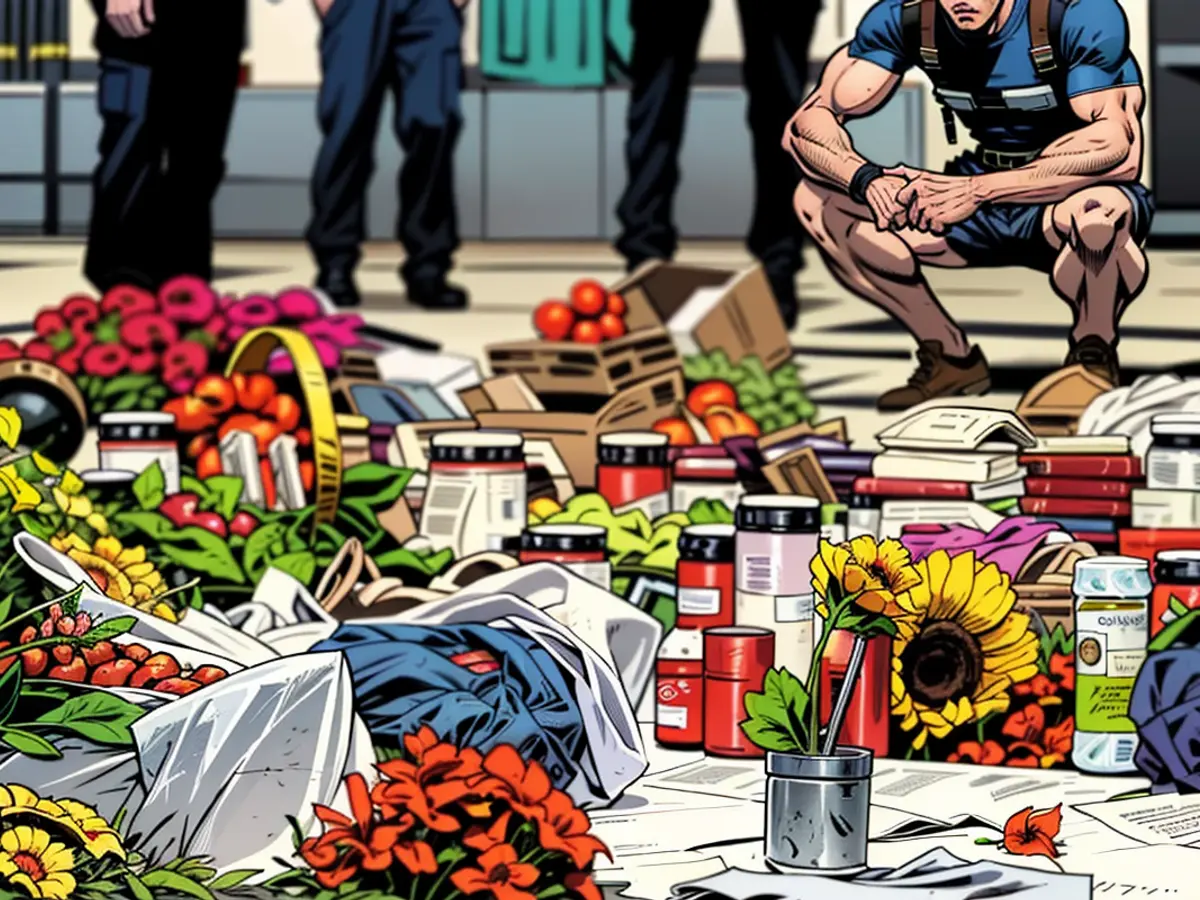- The Solingen incident prompts discussions on refugee policy and safety measures
Following the lethal knife assault in Solingen, there's been an increase in calls for stricter deportation policies and stronger gun control. The incident has prompted questions about why the authorities failed last year to deport the Syrian asylum seeker, who carried out the attack that resulted in three fatalities during a Friday evening street festival. Chancellor Olaf Scholz (SPD) is scheduled to visit Solingen today with NRW Minister President Hendrik Wüst (CDU) to honor the victims of the assault.
Eight individuals, including four seriously injured, were also impacted during the gathering in the Bergisches Land. A 26-year-old suspect, a Syrian national, has been in custody since Sunday evening, facing charges including murder and membership in the terrorist group Islamic State (IS). The terror organization has assumed responsibility for the assault and released a video on Sunday, which allegedly shows the perpetrator. However, it is still unclear when the video was recorded or if it actually depicts the offender.
Suspect's Deportation Delayed
According to "Spiegel," the suspect entered Germany at the end of 2022 and petitioned for asylum. At the time, the security forces were unaware of him as an Islamic extremist. These details were verified by the German Press Agency. His asylum application was subsequently denied, and he was due to be deported to Bulgaria in the previous year. However, given that he had gone into hiding in Germany, the deportation was initially postponed, as reported by "World."
Wüst Seeks Clarification within Authorities
NRW's Minister President Wüst also requests explanations from the authorities. "There are numerous questions that need to be answered. There are several authorities involved, so clarification is necessary, and clear statements must be made if something went wrong," he said on WDR television's "Current Hour." On ZDF's "heute journal," Wüst stated, "If something went wrong someplace, with which authority ever, whether on a local, county, or federal level, then the truth must be made known."
NRW's Interior Minister Herbert Reul (CDU) mentioned in the ARD program "Caren Miosga" that the detainee had not gone into hiding in a legal sense, as he was merely not present on the day he was to be taken into custody. "Otherwise, he was continually and frequently present at this facility." He also has numerous questions regarding the appropriateness, sufficiency, or excessive nature of these procedures, Reul added.
According to a compilation by the Office for the Protection of the Constitution, the Solingen attack was the most severe allegedly inspired by Islamic motives since the attack on a Berlin Christmas market in December 2016, which left 13 dead and 64 injured at the time.
Merz Pushes Refugee Ban from Syria and Afghanistan
One week before the state elections in Saxony and Thuringia, CDU leader Friedrich Merz has becoming more vocal against Chancellor Olaf Scholz (SPD) and advocated for a ban on accepting refugees from Syria and Afghanistan to Germany. In his email newsletter "MerzMail," he wrote, "After the terrorist act in Solingen, it should finally be clear: It's not the knives that are the issue, but the people who carry them around. In the majority of cases, these are refugees, and in the majority of cases, Islamic motivations lie behind the acts."
On ARD's "Brennpunkt," Merz declared, "If Solingen isn't the turning point for the coalition now, then I don't know what else needs to happen for some people to finally wake up."
Union faction deputy Jens Spahn (CDU) urged closures of borders to halt unlawful immigration. He informed the "Rheinische Post" (Monday), "For years, hundreds of young men from Syria and Afghanistan have been arriving in Germany and Europe every day. This has to end now."
Chancellor Scholz had previously announced in June, following the fatal knife attack in Mannheim, that the deportation of dangerous offenders and potential terrorist threats to Afghanistan and Syria would be reinstated.
SPD leader Laura Esken dismissed Merz's call for a halt to admissions, stating that such action "is not in line with our laws, not with the European Refugee Convention, and not with our constitution." However, serious criminals and Islamic threats can be expelled to these countries.
Bavaria's Minister-President Markus Söder (CSU) expressed the need for immediate detention and deportation of criminals, especially to Syria and Afghanistan, in ARD. Additionally, he suggested providing the police with more powers for checks.
President Steinmeier also called for expanded powers for security agencies to better protect against assaults. In a ZDF summer interview, he said, "Security agencies need to be equipped with necessary powers." He also advocated for more personnel for security agencies and expanding the Federal Criminal Office's powers in case of terrorist danger.
Justice Minister Buschmann announced talks on the knife control law. "We will now discuss in the federal government how we can further advance the fight against this type of knife crime," the FDP politician told "Bild am Sonntag." To date, the FDP has rejected Interior Minister Nancy Faeser's (SPD) proposals for stricter rules and prohibitions.
After the revelation of the suspect's delayed deportation despite being classified as an Islamic extremist and a danger to public safety, there have been calls for a review of the Law on Weapons and Immigration policies. The Law on Weapons should be amended to ensure stricter measures for potential terrorists and dangerous individuals who are denied asylum.
In light of this incident, there are renewed calls for a thorough review of the current immigration laws and the enforcement of the existing Law on Weapons to prevent such incidents in the future.








